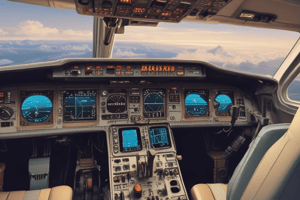Podcast
Questions and Answers
Which component supplies various air data parameters such as airspeed and altitude to EFIS instruments?
Which component supplies various air data parameters such as airspeed and altitude to EFIS instruments?
- Flight Management and Guidance Computers
- Integrated Standby Instrument System
- Air Data Reference (correct)
- Inertial Reference System
What does the Integrated Standby Instrument System (ISIS) replace?
What does the Integrated Standby Instrument System (ISIS) replace?
- Three conventional standby instruments (correct)
- The radio navigation systems
- The altitude warning system
- The primary flight display
What does the Flight Director provide during flight operations?
What does the Flight Director provide during flight operations?
- Automatic control of flight parameters
- Guidance for the pilot (correct)
- Rudder trim adjustments
- Throttle level management
Which of the following functions is NOT part of the Flight Augmentation Computer (FAC)?
Which of the following functions is NOT part of the Flight Augmentation Computer (FAC)?
Which system is responsible for calculating the aircraft's position during navigation?
Which system is responsible for calculating the aircraft's position during navigation?
In the case of EFIS system failures, which instrument can be used as a backup for airspeed?
In the case of EFIS system failures, which instrument can be used as a backup for airspeed?
What is indicated on the Primary Flight Display (PFD)?
What is indicated on the Primary Flight Display (PFD)?
Which component locks the side sticks in neutral position when the Auto Pilot (AP) is engaged?
Which component locks the side sticks in neutral position when the Auto Pilot (AP) is engaged?
Which of the following beacons is part of the Instrument Landing System (ILS)?
Which of the following beacons is part of the Instrument Landing System (ILS)?
What is the primary responsibility of the Cabin Intercommunication Data System (CIDS)?
What is the primary responsibility of the Cabin Intercommunication Data System (CIDS)?
What is the primary function of the Radio Management Panel (RMP) during a failure?
What is the primary function of the Radio Management Panel (RMP) during a failure?
Which altimeter provides accurate measurements of the aircraft's height above ground during specific flight phases?
Which altimeter provides accurate measurements of the aircraft's height above ground during specific flight phases?
Which part of the Auto Flight System is responsible for fault isolation and detection?
Which part of the Auto Flight System is responsible for fault isolation and detection?
Which component supplies data to the Electronic Flight Instrument System (EFIS)?
Which component supplies data to the Electronic Flight Instrument System (EFIS)?
What is the main function of the Centralized Fault Display Interface Unit (CFDIU)?
What is the main function of the Centralized Fault Display Interface Unit (CFDIU)?
Which of the following statements about the Display Management Computers (DMCs) is correct?
Which of the following statements about the Display Management Computers (DMCs) is correct?
What is the primary role of the Solid-State Flight Data Recorder (SSFDR)?
What is the primary role of the Solid-State Flight Data Recorder (SSFDR)?
Which electrical power component is responsible for converting AC to DC?
Which electrical power component is responsible for converting AC to DC?
How many identical engine driven generators are used as the main power source in the Electrical Power System?
How many identical engine driven generators are used as the main power source in the Electrical Power System?
Which system is described as the 'heart of the ECAM system'?
Which system is described as the 'heart of the ECAM system'?
What device allows reading or printing of the failure information in the cockpit?
What device allows reading or printing of the failure information in the cockpit?
What component is primarily responsible for collecting waste water on the aircraft?
What component is primarily responsible for collecting waste water on the aircraft?
At what altitude does the vacuum generator stop being activated by the VSCF?
At what altitude does the vacuum generator stop being activated by the VSCF?
How many fire bottles are equipped for each engine to extinguish a fire?
How many fire bottles are equipped for each engine to extinguish a fire?
What is the primary function of the cooling system in the avionics compartment?
What is the primary function of the cooling system in the avionics compartment?
Where is the service panel for refueling located on the aircraft?
Where is the service panel for refueling located on the aircraft?
How many detection loops are in the APU's fire detection system?
How many detection loops are in the APU's fire detection system?
What is discharged into the forward cargo compartment for fire extinguishing?
What is discharged into the forward cargo compartment for fire extinguishing?
How many smoke detectors are installed in each lavatory?
How many smoke detectors are installed in each lavatory?
What is the primary function of the APU in an aircraft?
What is the primary function of the APU in an aircraft?
Which component is responsible for fault monitoring of the APU?
Which component is responsible for fault monitoring of the APU?
What voltage and frequency does the APU generator typically provide?
What voltage and frequency does the APU generator typically provide?
Where is the Electronic Control Unit (ECU) typically located in relation to the APU?
Where is the Electronic Control Unit (ECU) typically located in relation to the APU?
Which of the following statements about the CFM56-5B powerplant is correct?
Which of the following statements about the CFM56-5B powerplant is correct?
Flashcards are hidden until you start studying
Study Notes
Electronic Instrument System (EIS)
- The EIS is a sophisticated system for aircraft monitoring and control.
- It consists of two main components: the Electronic Flight Instrument System (EFIS) and the Electronic Centralized Aircraft Monitoring (ECAM) system.
Electronic Flight Instrument System (EFIS)
- The EFIS provides the pilots with vital flight information.
- EFIS displays receive data from the Air Data and Inertial Reference System (ADIRS).
- The EFIS is used to display flight parameters like airspeed, altitude, and heading on the Primary Flight Display (PFD) while the Navigation Display (ND) shows flight plan and navigation data.
Electronic Centralized Aircraft Monitoring (ECAM) System
- The ECAM system provides a centralized display of aircraft systems data, warnings, and faults.
- It consists of two main displays: the Engine Warning Display (EWD) and the Systems Display (SD).
- The ECAM system relies on the Flight Warning Computers (FWC), which process data from various aircraft systems.
Centralized Fault Display System (CFDS)
- The CFDS stores fault information for future analysis.
- Information stored in the CFDS can be accessed and printed using the Multipurpose Control and Display Unit (MCDU).
ELogbook
- The ELogbook is a laptop computer used to manage and record flight data.
Digital Flight Data Recording
- The Solid-State Flight Data Recorder (SSFDR) captures critical flight parameters and system data for crash investigation purposes.
Aircraft Integrated Data System
- This system monitors engine condition and aircraft performance.
Electrical Power System
- The aircraft's electrical system is powered by two Integrated Drive Generators (IDGs) as the main power source.
- The ECAM Electrical System page displays real-time data on the aircraft's electrical power systems, including voltage and frequency.
Air Data / Inertial Reference System (ADIRS)
- The ADIRS provides accurate information about the aircraft's altitude, airspeed, and heading.
- The system consists of three ADIRUs (Air Data and Inertial Reference Units) that are controlled by a single ADIRS Mode Selector Unit (MSU).
- Data from air data sensors, such as pitot probes, static ports, angle of attack sensors, and total air temperature sensors, is collected and transmitted to the ADIRUs.
- The ADIRUs provide information to the EFIS and the Flight Warning Computer (FWC).
Landing Aids
- ILS and Marker System provides guidance during approach and landing phases.
- The PFD displays the localizer and glide slope information.
- The aircraft can be guided by either ILS 1 or ILS 2 on the PFD and ND displays.
Radio Navigation
- The Navigation computer function in the Flight Management and Guidance Computers (FMGCs) calculates aircraft position.
- Navigation data can be manually entered or received automatically.
- In case of FMGC or MCDU failures, the Radio Management Panel (RMP) can be used for backup tuning of navigation receivers.
Enhanced Ground Proximity Warning System
- EGPSW alerts pilots of potential ground proximity issues.
TCAS/T2CAS
- Terrain and Traffic Avoidance System alerts pilots of potential collisions with other aircraft.
Radio Altimeter
- The Radio Altimeter provides height above ground measurement during the initial climb, approach, and landing phases.
- It is located in the AFT Cargo compartment.
Auto Flight System (AFS)
- The AFS is crucial for automatic flight control and includes the following components:
- Flight Management (FM)
- Flight Guidance (FG)
- Flight Augmentation
- Fatigue Isolation and Detection System (FIDS)
- The FMGCs carry out the Flight Management (FM) and Flight Guidance (FG) functions, while the Flight Augmentation Computers (FACs) handle flight augmentation and FIDS.
Flight Management and Guidance Computer (FMGC)
- The FMGCs manage flight control functions and support the autopilot, flight director, and auto-thrust systems.
- FMGCs manage flight parameters, such as airspeed and Mach Number.
Flight Augmentation Computer (FAC)
- FACs provide supplemental flight control functions such as yaw damper, rudder trim, rudder travel limitation, and flight envelope protection.
- FIDS is managed by FAC 1.
Flight Control Unit (FCU)
- The FCU is located on the front panel and includes the AFS control panel, along with the EFIS control panels.
Side Sticks
- The side sticks are locked when the autopilot is engaged.
Throttle Levers
- The throttles can be used to manually or automatically control the engines via the auto-thrust system.
Communication System
- This system comprises components for communication with ground, cabin crew, and passengers.
Solid State Cockpit Voice Recorders
- This system records flight crew conversations and communications.
CIDS (Cabin Intercommunication Data System)
- The CIDS is an intercom and communication system for cabin crew, with controls on the Flight Attendant Panel (FAP).
Waste Holding Tank
- The aft cargo area houses the waste holding tank.
Potable Water Tank
- The forward cargo area contains the potable water tank.
A318, A319, A320
- Water servicing is done through dedicated panels: a water servicing panel and a drain servicing panel.
Gray Water
- Gray water from lavatories, washbasins, and galley sinks is collected.
Vacuum Toilet System
- The vacuum toilet system is activated by a generator above 16,000 ft, eliminating the need for a separate waste tank.
Service Panel Locations
- Potable water panel is located on the right-hand side, and the gray water panel is on the left-hand side.
ATA 28 Fuel System
- The A/C is equipped with fuel tanks in the fuselage and wings.
- The number of fuel pumps varies depending on the model: A318/319/320 have 7 pumps (2 on the left wing, 2 on the right wing, 2 in the center tanks, and 1 for the APU). The A321 has 5 pumps with no outer or inner tanks.
- Refueling and defueling are accomplished on the right side of the fuselage.
ATA 24 Fire Protection
- Engine Fire Protection: Two identical detection loops monitor for fire. In case of fire detection, fuel, hydraulic, electrical, and bleed Air supply are cut off, and the extinguishing system is activated.
- APU Fire Protection: Two detection loops are used for APU fire detection.
- Avionics Compartment Smoke Detection: The system utilizes smoke detectors in the extraction duct, which is connected to the avionics cooling system.
- Cargo Compartments: Smoke detectors are installed in each cavity of the cargo compartment.
- Lavatory Smoke Detection: Each lavatory has a smoke detector.
ATA 49 APU
- The APU is located at the aft of the A/C.
- It supplies electrical power, bleed air for engine starting and air conditioning on the ground.
- The ECB (Electronic Control Box) manages and controls the APU, and its operation is displayed on the ECAM APU page.
- APU generator produces 115 volts and 400 Hz.
Power Plant
- The aircraft is powered by CFM56-5B turbofan engines featuring a dual rotor, variable stator, and high bypass ratio design.
- The ECM manages engine control and monitoring and is connected to the FADEC (Full Authority Digital Engine Control).
FADEC (Full Authority Digital Engine Control)
- Each engine is controlled by a dual channel computer known as the ECU (Electronic Control Unit) which processes data from the FADEC system.
Thrust Reversal System
- The thrust reverser system is hydraulically activated by the Spoiler Elevator Computer (SEC).
Dry and Wet Sections
- The engine is divided into dry and wet sections, the dry section on the right hand side and the wet section on the left.
Fuel System
- The engine's fuel system is driven by the gearbox and includes a filter within the pump.
Studying That Suits You
Use AI to generate personalized quizzes and flashcards to suit your learning preferences.




